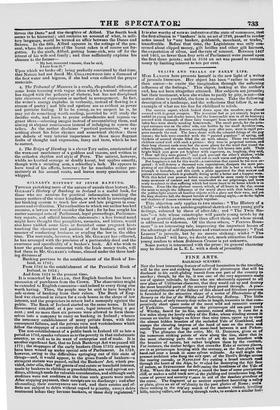GILBART'S HISTORY OF IRISH BANKING.
THOUGH partaking more of the nature of annals than history, Mr. GILBART'S History of Banking in Ireland is a useful hook, for
those who are anxious for practical information touching the money matters of the sister kingdom, or who wish by investigating her banking system to track her slow and late progress in com- merce and civilization. The authorities to which our author has had recourse, a lawyer would consider the best ; for he has sought his matter amongst acts of Parliament, legal proceedings, Parliamen-
tary reports, and official business statements : a less formal mind might have thought that pamphlets, memoirs, and letters, would also have yielded some facts or furnished some pregnant hints touching the character and position of the bankers, and their manner of conducting business or evading the law in the olden time. The materials, however, which Mr. GILBART has collected, he has arranged with the precision of a partnership deed and the exactness and speeificality of a banker's book. All who wish to know the great facts connected with the Irish money trade, will find them in Mr. GILBART.S volume, classed under the three lead- ing divisions of
Banking previous to the establishment of the Bank of Ire- land, in 1782 ; From 1782 to the establishment of the Provincial Bank of Ireland, in 1824 ; And from 1824 to the present time.
It is remarked by HALLAM, that English freedom has been a succession of purchases from the Crown. The observation might be extended to English commerce—awl indeed to every thing else worth having. Thus. the people may be said to have bought a .safe system of banking from their rulers. The Bank of Eng- land was chartered in return for a cash bonus in the shape of low interest, and the proprietors in return had a monopoly against the public. The Bank of Ireland started on the same terms. It lent Government 600,0001. at 4 per cent., legal interest being 6 per cent. ; and no more than six persons were allowed to form them- selves into a company to carry on banking in Ireland ; whence the necessary establishment of many private firms, with their consequent failures, and the private ruin and wretchedness which follow the stoppage of a country district bank. The non-establishment of a public bank in Ireland till so late a period as 1782, speaks volumes as to the poverty in that unfortunate country, as well as to its want of enterprise and of trade. It is another significant fact, that no Irish Bankrupt Act was passed till 1771; the stoppages of the early bankers (from 1733) seeming to have been wound up under special acts of Parliament. In 1759, however, owing to the difficulties springing out of this state of things—and, it would' appear, to the gross frauds of bankers—a stringent statute was passed, called the Bankers' Act, which pro- vided, inter alia, that "all grants of real estate or leasehold interest, made by bankers to children or grandchildren, are void against cre- ditors, although made for valuable consideration, and although such creditors were not creditors at the time such grants were made. After stopping payment, their receipts are no discharge; and after absconding, their conveyances are void, and their estates and ef- fects are subject to debts without regard to priority, excert debts contracted before they became bankers, or those duly registered." It is also worthy of note as indicative of the state of commerce, that the first allusion to "bankers" is in an act of 1709, passed to render notes issued by "any banker, goldsmith, merchant, or trader," transferable. Before that time, the Legislature was only coa. cerned about clipped money, gilt bridles and other gilt harness, the exportation of silver, and the rate of interest. Between 1447 and 1463, no fewer than four acts of Parliament were passed upon the first three points; and in 1634 an act was passed to restrain, usury by limiting interest to ten per cent.


























 Previous page
Previous page